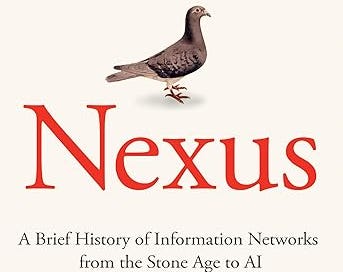Information = Profit
Book Review: Nexus: A Brief History of Information Networks from the Stone Age to AI
“Knives and bombs do not themselves decide whom to kill. They are dumb tools, lacking the intelligence necessary to process information and make independent decisions. In contrast, AI can process information by itself, and thereby replace humans in decision making. AI isn’t a tool—it’s an agent.”
― Yuval Noah Harari, Nexus: A Brief History of Information Networks from the Stone Age to AI
Genre: Nonfiction
My Rating: Five out of five stars
Yuval Noah Harari’s Nexus: A Brief History of Information Networks from the Stone Age to AI delves into the evolution of information dissemination and its profound impact on human societies. Building upon themes from his earlier works, Harari examines how narratives—from ancient myths to modern algorithms—have shaped collective human behavior.
In Nexus, Harari revisits ancient networks, highlighting religious texts like the Bible, which, despite inaccuracies, unified vast populations. He emphasizes that the power of information lies not in its factual accuracy but in its ability to connect people, stating, “Information doesn’t necessarily inform us—it puts things in formation.”
Transitioning to the digital age, Harari discusses modern networks driven by algorithms and data. He draws parallels between social media platforms and ancient myths in their role in shaping collective narratives. However, he cautions that today’s networks, increasingly controlled by machines, often lack the human-centered wisdom to foresee their consequences, noting, “Networks are powerful, but they are also blind.”
Harari raises critical questions about the equitable distribution of AI’s economic benefits. He warns that if current trends continue, leading AI superpowers like China and the U.S. are likely to claim the majority of gains, deepening global inequality. Will AI’s advancements be equitably distributed, or will they further entrench existing power imbalances?
Nexus serves as both a warning and a call to action. Harari urges a cautious approach to AI and digital technologies, recognizing that while these systems can enhance human capabilities, they can also outpace our understanding. Information networks are only as wise as the humans who build and control them. If we fail to thoughtfully guide the development of AI, we may find ourselves at the mercy of the very systems we created.
If you enjoyed this review, check these out!





